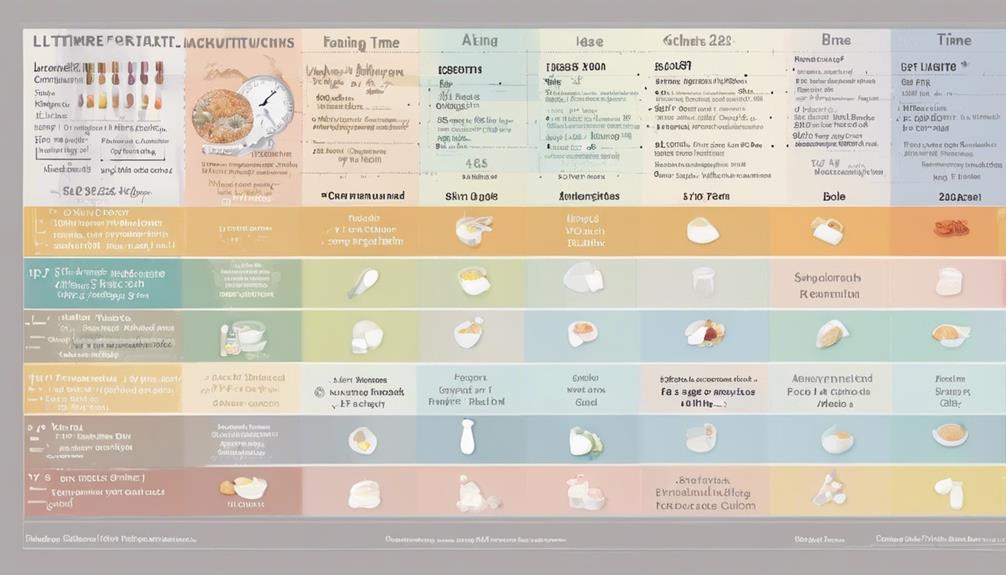Let’s talk about the ongoing debate between breastfeeding and formula feeding. Both sides have strong opinions, but have you thought about the specific pros and cons of each method?
While one might seem like the obvious choice, the reality is far more complex. From nutritional benefits to practical considerations, there's a lot to unpack when it comes to deciding how to nourish your little one.
So, let's explore the intricacies of this important decision together.
Key Takeaways
- Breastfeeding provides essential nutrients, antibodies, and immune support for optimal baby development.
- Formula feeding allows for family bonding and flexibility in caregiving schedules.
- Breastfeeding fosters a strong emotional bond between mother and infant.
- Formula feeding incurs a financial burden and lacks the protective benefits of breast milk.
Benefits of Breastfeeding
Breastfeeding provides essential nutrients and antibodies necessary for a baby's best growth and development. Breast milk is a powerhouse of antibodies, proteins, and fats that boost the baby's immune system, protecting them from allergies, eczema, ear infections, and gastrointestinal issues.
The antibodies in breast milk act as natural defenders, reducing the risk of respiratory illnesses and the need for hospitalization. Apart from the physical health benefits, breastfeeding also fosters a strong emotional bond between the mother and infant through skin-to-skin contact and the release of oxytocin, known as the love hormone. This bond is crucial for the baby's emotional well-being and development.
Additionally, breastfeeding has been linked to a decreased risk of sudden infant death syndrome (SIDS), making it not just beneficial but potentially life-saving. The health advantages of breastfeeding recommended by esteemed medical organizations like the American Academy of Pediatrics and the World Health Organization make it a cornerstone of infant care.
Advantages of Formula Feeding

Choosing formula feeding for infant nutrition offers several practical advantages that cater to different family dynamics and lifestyles. Partners can actively participate in feedings, fostering family involvement and bonding.
Formula feeding provides convenience and flexibility, seamlessly fitting into various schedules and routines. Caregivers, including partners, can easily share the responsibility of feeding the baby with formula, allowing for a more equal distribution of caregiving tasks.
Unlike breastfeeding, formula feeding doesn't impose dietary restrictions on the mother, granting her more culinary freedom. Additionally, formula feeding permits occasional alcohol consumption without compromising the baby's nutrition, offering parents the ability to enjoy a drink responsibly.
These advantages of formula feeding contribute to a more inclusive approach to infant care, promoting shared responsibilities and accommodating diverse family dynamics and lifestyles.
Drawbacks of Breastfeeding
Shifting from the advantages of formula feeding, it is important to acknowledge the challenges associated with breastfeeding that can impact a mother's experience and decision-making process surrounding infant nutrition. Breastfeeding presents various obstacles that can make it a taxing experience for some mothers. Factors such as discomfort, pain, societal norms, lack of support, and time constraints can all contribute to the challenges faced by breastfeeding mothers.
| Challenges | Impact |
|---|---|
| Discomfort | Sore nipples or engorgement can make breastfeeding a painful experience |
| Societal norms | Public breastfeeding may be uncomfortable due to societal expectations |
| Lack of support | Inadequate support systems can hinder successful breastfeeding |
| Working mothers | Finding time and privacy to pump milk at work can be a significant hurdle |
| Medical conditions | Certain health conditions or medications may limit breastfeeding feasibility |
These challenges highlight the multifaceted nature of breastfeeding and emphasize the need for tailored support and understanding for mothers dealing with these difficulties.
Disadvantages of Formula Feeding

When considering infant nutrition, it's essential to be aware of the drawbacks associated with formula feeding. Formula lacks the protective antibodies and immune support present in breast milk, making infants fed formula more susceptible to allergies and respiratory infections. Additionally, formula feeding can be financially burdensome, with costs ranging from $800 to $2,800 annually.
Bottle-fed babies may also experience more digestive issues, such as constipation and gas, compared to breastfed babies. The expenses can further increase if parents opt for brand-name formulas, which are much pricier than generic options. This cost disparity adds to the overall financial burden of formula feeding.
It's important for caregivers to weigh these disadvantages carefully when deciding between breast milk and formula, considering both the health implications and the economic factors involved in providing the best nutrition for their infants.
Comparison of Breastfeeding and Formula Feeding
Moving from the drawbacks of formula feeding, it becomes evident that a direct comparison between breastfeeding and formula feeding highlights significant differences in the nutritional and immunological benefits provided to infants. Breastfeeding offers passive immunity and essential nutrients that formula feeding can't replicate. Breast milk plays an important role in aiding the absorption of nutrients and fostering a strong bond between the mother and baby.
In contrast, formula feeding lacks the protective benefits of breast milk, such as antibodies and immune support, leaving babies more vulnerable to infections and illnesses. Breastfed babies also tend to experience fewer digestive issues compared to formula-fed babies, as breast milk supports the maturation of the baby's digestive tract. This maturation process not only enhances overall health but also contributes to a stronger immune system.
When considering the health, immunity, and bonding aspects, breastfeeding emerges as a superior choice over formula feeding for the best well-being of infants.
Frequently Asked Questions
Are Breastfed Babies Healthier Than Formula Fed?
Yes, breastfed babies are typically healthier than formula-fed infants. Breast milk's antibodies bolster the immune system, reducing illnesses. Formula-fed babies face higher risks of obesity and diabetes. Breastfeeding also correlates with lower SIDS rates and long-term health benefits.
Is It Better to Give Your Baby Breastmilk or Formula?
When deciding between breastmilk and formula, consider individual needs and circumstances. Breastfeeding offers unique nutrients and antibodies, while formula provides convenience and flexibility. The choice should prioritize the baby's health and the mother's well-being.
What Are the Downsides of Formula Feeding?
We acknowledge formula feeding's downsides, such as higher illness risk, digestive issues, costs, and missed hormonal benefits. Breastfeeding's cognitive and developmental advantages may impact long-term health. Consider these factors when deciding on feeding methods for your baby.
What Are 5 Disadvantages of Breastfeeding?
Breastfeeding can be challenging due to discomfort, time commitment, latching issues, dietary restrictions, and public scrutiny. When deciding on the feeding method that works best for you and your baby, it is crucial to take these factors into account.
Conclusion
To summarize, while breastfeeding offers numerous health benefits for both baby and mother, formula feeding provides convenience and flexibility.
It's ironic that the natural choice of breastfeeding may come with challenges such as time commitment and potential discomfort, while formula feeding, despite lacking some protective benefits, can be a more practical option for many families.
Ultimately, the decision between breastfeeding and formula feeding should be based on individual circumstances and needs.










